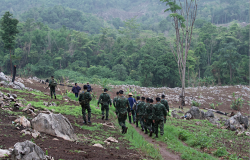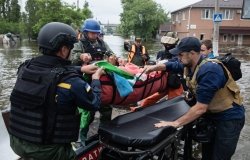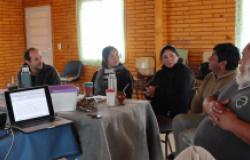'Managing Our Planet' Series Kicks Off January 19
A year-long series of science and policy dialogues announced, hosted by George Mason University and Woodrow Wilson International Center for Scholars.
FAIRFAX, Va., January 13, 2011—George Mason University and the Woodrow Wilson International Center for Scholars announce a year-long series of dialogues on issues such as climate change, ecosystem change, energy demands and demographic trends.
The first discussion, taking place on January 19, 2011, from 3 to 5 p.m. at the Woodrow Wilson Center in D.C., will include Dennis Dimick, executive editor of National Geographic; Molly Jahn, Dean of the College of Agricultural and Life Sciences at the University of Wisconsin-Madison; Thomas Lovejoy, University Professor of Environmental Science and Policy at George Mason University; and Juliet Eilperin, reporter for The Washington Post. The event will be webcast live at www.wilsoncenter.org/ondemand.
The series hopes to illuminate the environmental challenges of climate change, ecosystem change, energy demands and demographic trends, among others. Leaders from George Mason University, on Earth Day 2010, identified a need for a public forum of science-anchored discussions on planetary management. The Environmental Change and Security Program at the Woodrow Wilson Center joined this effort to explore the science/policy interface of planetary management. The program will be developed jointly by Mason and the Woodrow Wilson Center and will actively foster discussion with academics, managers, policymakers and other interested sectors.
"The living planet is degrading," says Vikas Chandhoke, dean of Mason's College of Science. "Only collective action at the level of managing the biology and systems of the planet can ameliorate the trends and move the planet and humanity to a more sustainable future. This can only be achieved with the best of the sciences (including social sciences) and an integrated effort with the world of policy and practitioners."
"These global issues—biodiversity, demography, climate change, energy use, and water scarcity—require big thinking. This series will bring scientists and policymakers together to bridge the gaps between sectors and disciplines," says the Wilson Center's Geoff Dabelko, director of the Environmental Change and Security Program.
Managing Our Planet dialogues will be held monthly on Wednesdays between 3 and 5 p.m. at the Woodrow Wilson Center (Woodrow Wilson International Center for Scholars, Ronald Reagan Building and International Trade Center, One Woodrow Wilson Plaza, 1300 Pennsylvania Ave., NW, Washington, DC 20004-3027) beginning January 19, 2011. Directions can be found at: www.wilsoncenter.org/directions.
The Woodrow Wilson Center and the following Mason entities: College of Science; College of Humanities and Social Sciences; School of Public Policy; Center for Climate and Society; Center for Climate Change Communication; COLA; ESP; and Institute for Conflict Analysis and Resolution; will organize the individual events.
About George Mason University
Named the #1 national university to watch in the 2009 rankings of U.S. News & World Report, George Mason University is an innovative, entrepreneurial institution with global distinction in a range of academic fields. Located in Northern Virginia near Washington, D.C., Mason provides students access to diverse cultural experiences and the most sought-after internships and employers in the country. Mason offers strong undergraduate and graduate degree programs in engineering and information technology, organizational psychology, health care and visual and performing arts. With Mason professors conducting groundbreaking research in areas such as climate change, public policy and the biosciences, George Mason University is a leading example of the modern, public university. George Mason University—Where Innovation Is Tradition.
About The Woodrow Wilson International Center for Scholars
The Woodrow Wilson International Center for Scholars is the living, national memorial to President Wilson established by Congress in 1968 and headquartered in Washington, D.C. It is a nonpartisan institution, supported by public and private funds, engaged in the study of national and world affairs.
Since 1994, the Wilson Center's Environmental Change and Security Program has explored the connections among environmental challenges and their links to conflict and security.
Related Program

Environmental Change and Security Program
The Environmental Change and Security Program (ECSP) explores the connections between environmental change, health, and population dynamics and their links to conflict, human insecurity, and foreign policy. Read more










